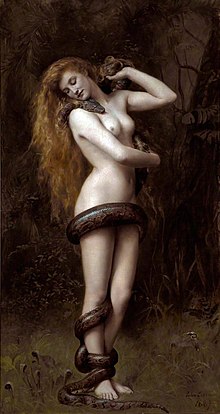This article needs additional citations for verification. (June 2021) |

Lilith, a biblical character suggested to be Adam's first wife and a significant female figure from Jewish mythology, has been developed over time into distinct characters in popular culture.[1][2] One writer on witches, Judika Illes, wrote, "No spirit exerts more fascination over media and popular culture than Lilith. Her appearances are genuinely too numerous to count."[3][4][5] Lilith is one of several figures with biblical or related origins integrated into popular culture who have been titled demon.[6][7]
- ^ Josef Steiff, Tristan D. Tamplin Battlestar Galactica and Philosophy 2008 But popular culture has given Lilith and, by extension, Eve, the opportunity to recast those aspects of their characters that have been vilified and associated with their gender.
- ^ Jim Leach - Claude Jutra: Filmmaker - Page 267 1999 "Although part of a popular and not necessarily Jewish belief, Lilith became a very important component of Lurianic kabalah, being part of the powers of evil that hamper the struggle to purify and redeem the universe. Thus popular culture ..."
- ^ Judika Illes The Weiser Field Guide to Witches: From Hexes to Hermione Granger Page 153 2010 "Some legends depict her as a powerful guardian spirit. No spirit exerts more fascination over media and popular culture than Lilith. Her appearances are genuinely too numerous to count. Lilith herself, or characters named in her honor ..."
- ^ Alejandra Elenes Transforming Borders: Chicana/O Popular Culture and Pedagogy Page 77 - 2010 "Chicana/O Popular Culture and Pedagogy Alejandra Elenes. European Syncretism Some of the Western figures that are believed to be related to La Llorona include Medea, Lilith, Lamia, and the White Lady. The distinct relationship between ..."
- ^ Mary Lynn Kittelson The soul of popular culture: looking at contemporary heroes Page 109 1998 "Indeed, one of the most popular American cinemyths is the demonization of the Other Woman. This is not a new story, for its roots go back to Biblical mythology and the legend of Lilith, first wife of Adam. Lilith was Adam's equal and therefore ..."
- ^ Philip Leroy Culbertson, Elaine Mary Wainwright The Bible in Popular Culture Page 52 - 2010 "Trouble ensues when the head vampire, lilith (yes, that lilith), sends her best assassin, Sistine centuria, to new Vatican city (nVc) to deal with Jesus."
- ^ Marcel Danesi X-rated!: the power of mythic symbolism in popular culture 2009 "This book delves into the reasons why pop culture, and all of its "X-Rated" features, are so appealing to masses of people, even though they may hate to love it."